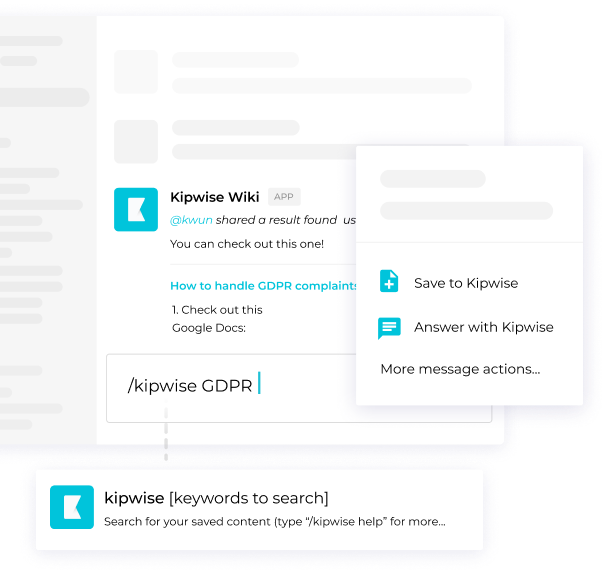It has been a few weeks since you put your team to work remotely due to the lockdown. Everything happened quickly. You found some cool tools, added some new collaboration processes, and hoped that everything would go well. But it didn’t. Why not?
Let’s admit that some people don’t fit into a remote-work setting
Useful tools and processes alone are not going to help if your teammates don’t fit the remote environment. Someone could be doing well (or at least seeming to do well) in the office, but they might lack the important traits to work remotely.
Kipwise is a 100% remote team with teammates from the Americas, Europe, and Asia. From our experience, we have observed three important traits that make for a great remote worker (or a great team member in general). Unlike tactical skills, these traits are hard to “train”. That’s why the hiring process is the most important part of creating a successful remote team. Whether you have hired the right person will greatly determine whether the team will actually work.
We are sharing our learnings here, along with the extra steps we include in our hiring process, to help you spot the right fit in the candidate pool.
1. Passion
It is common to see “passion” being listed as one of the important requirements in job ads. However, ironically, hiring decisions are not often made based on this criterion, as it’s hard to measure and quantify. In an interview setting, it’s easy for the candidates to “say” that they are passionate about something when, in fact, they are not.
This is the major reason why many corporations are suffering due to remote working, as most of their employees are not really passionate about their jobs.
At Kipwise, we start looking for hints about a person’s passion as early as the resume screening stage. A person said that he is passionate about machine learning? Did he do any relevant side projects or engage in any non-work-related experience in relevant fields?
It’s important to find someone who really enjoys doing what they need to do at work. That means they are happy to do their job when the line between personal and professional is blurry while working remotely.
👍 TO-DO
Discover the sweet spot where passion meets work in your teammates.
2. Proactiveness
Working remotely means you cannot physically see whether your teammates are struggling with certain tasks. You cannot see them head-scratching. You cannot hear them sighing. Proactiveness becomes the key to effectively solving problems as a team. Remote teammates have to raise questions and ask for help at the right moments.
During our hiring process, we give candidates a simple-enough task to work on, to simulate working together. However, to test the candidate’s proactiveness, we make the requirements of the task less detailed on purpose so that the candidate is unlikely to finish it without asking any questions. During the call, we also emphasize the importance of asking questions to reassure the candidate that they won’t look stupid if they do ask a lot of questions.
The blurry requirements tactic is surprisingly useful in screening out candidates who might be great on paper and interviews, but who are not good enough to work remotely as a team.
Some candidates completed the tasks in the wrong direction, without asking any questions. Some didn’t get back to us for over a week and tried to figure out everything on their own in very cost-ineffective ways. A simple “ask questions if needed” could go wrong in many different ways if you are not physically sitting together in the same office.
👍 TO-DO
Clearly explain the need to ask questions and reassure the candidate that they won’t look stupid if they ask several questions.
3. Self-discipline
The biggest worry of managers when it comes to remote work is usually about teammates slacking off without managers being present. This is not a remote-only problem. Just because someone is sitting in the office doesn’t mean that they are being productive.
However, the slacking-off issue is amplified when someone who’s not self-disciplined works from home instead of from the office.
That’s why we list passion as the most important trait in our hiring process, as enjoying the work is the key to maintaining self-discipline. It’s difficult to force someone to be productive on something they don’t like. The task we give candidates during the hiring process also works as an indicator to see if someone can deliver without close monitoring.
At the same time, trust is a two-way street. We don’t apply any anti-slack-off measures in our workflow at Kipwise. We set up the goals we want to achieve together every two weeks, and we don’t care when the teammates are going to work. Some are early birds, so they start the day at 7 am, while others are night owls who work until 11 pm. There have been cases of teammates switching a weekday with a Sunday to handle family or bank-related issues. If teammates are self-disciplined, these issues won’t affect productivity.
👍 TO-DO
Focus on building trust and achieving goals instead of measuring working hours. Avoid assuming that teammates are slacking-off without knowing the obstacles they face.
Re-assess the team and re-align the expectations
No one knows when this lockdown situation will be over. To keep it going smoothly, it is important to assess the whole team, including yourself, to see if everyone is passionate, proactive, and self-disciplined enough to stay productive.
At the same time, it is important to ensure that everyone clearly knows that the way they work is going to be different for a while. This means that those who don’t fit must change so that they do fit.
The benefits of doing so will remain after this tough period. After all, remote work doesn’t create these new problems. It simply amplifies existing problems that you weren’t aware of previously. Start fixing these issues and you will become a better team after this challenging period is over.
We are chatting with different teams to share their experience transitioning from office to work-from-home. Follow us on Twitter for the updates!




